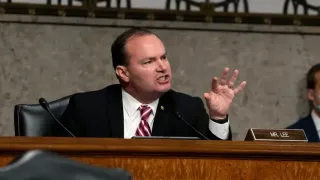
4 hours ago
U.S. Supreme Court to Weigh Whether to Hear Bid to Overturn Obergefell, the Ruling That Legalized Same-Sex Marriage
READ TIME: 3 MIN.
The U.S. Supreme Court will consider this fall whether to grant review in a case that directly asks the Court to overturn Obergefell v. Hodges, the landmark 2015 ruling that recognized a constitutional right to marry for same-sex couples nationwide. The petition is tied to former Kentucky county clerk Kim Davis’s appeal of a civil judgment stemming from her refusal in 2015 to issue marriage licenses to a same-sex couple while acting in her official capacity.
According to reporting summarized by KFF Health News from ABC News’ coverage, Davis is appealing a $100,000 jury award for emotional damages and $260,000 in attorneys’ fees and argues that Obergefell was “egregiously wrong,” positioning her First Amendment free exercise claim against established constitutional protections for marriage equality. The justices are expected to meet in conference this fall to decide whether to accept or deny the case, marking the first formal bid since 2015 to have the Court revisit and reverse Obergefell.
The appeal arises from litigation brought by David Ermold and David Moore, who sued Davis after she declined to issue them a marriage license following the Obergefell decision, leading to significant damages and fees assessed by lower courts. Those courts rejected Davis’s constitutional defenses, finding that as a government official she could not withhold licenses based on her personal religious beliefs.
ABC News reported that the Davis petition represents a direct challenge to the constitutional foundation of Obergefell, which grounded marriage equality in the Fourteenth Amendment’s due process and equal protection guarantees. A decade after Obergefell, the Supreme Court’s decision whether to hear the case could signal how far the current conservative majority is willing to go in revisiting precedent that expanded LGBTQ+ rights.
Legal observers interviewed by local and national outlets say the Supreme Court is unlikely to grant review in Davis’s case, noting the petition does not present the cleanest vehicle to reconsider marriage equality and that lower courts have consistently rejected her defenses. However, they cautioned that after the reversal of Roe v. Wade, LGBTQ+ rights advocates cannot assume marriage equality is insulated from future challenges.
If the Court were to grant the petition and ultimately overturn Obergefell, access to marriage for same-sex couples would likely revert to the states, reactivating dormant bans or restrictions still on the books in many jurisdictions, according to recent analyses cited by KFF Health News. Such a shift would create immediate disparities in marriage access based on geography and could prompt couples to travel out of state to marry.
Even in that scenario, the federal Respect for Marriage Act—signed into law in 2022—requires federal recognition of valid marriages and obligates states to recognize marriages lawfully performed elsewhere, though it does not compel states to issue marriage licenses if Obergefell were overturned. Local reporting has underscored that distinction and the practical ramifications for families.
Public opinion has continued to trend in favor of marriage equality over the last decade, a context highlighted in recent coverage noting that national support for same-sex marriage has grown since 2015 even as partisan divides persist. Although public sentiment does not determine constitutional outcomes, sustained majority support may shape the political environment surrounding the Court’s consideration of whether to hear the case.






